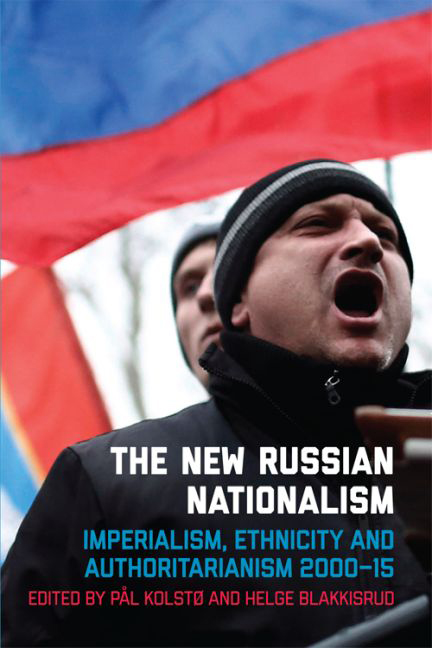Book contents
- Frontmatter
- Contents
- List of Figures
- List of Tables
- Acknowledgements
- Notes on Contributors
- Introduction: Russian nationalism is back – but precisely what does that mean?
- 1 The ethnification of Russian nationalism
- 2 The imperial syndrome and its influence on Russian nationalism
- 3 Radical nationalists from the start of Medvedev's presidency to the war in Donbas: True till death?
- 4 Russian ethnic nationalism and religion today
- 5 Everyday nationalism in Russia in European context: Moscow residents’ perceptions of ethnic minority migrants and migration
- 6 Backing the USSR 2.0: Russia's ethnic minorities and expansionist ethnic Russian nationalism
- 7 Rallying ’round the leader more than the flag: Changes in Russian nationalist public opinion 2013–14
- 8 How nationalism and machine politics mix in Russia
- 9 Blurring the boundary between civic and ethnic: The Kremlin's new approach to national identity under Putin's third term
- 10 Russia as an anti-liberal European civilisation
- 11 Ethnicity and nationhood on Russian state-aligned television: Contextualising geopolitical crisis
- 12 The place of economics in Russian national identity debates
- Bibliography
- Index
1 - The ethnification of Russian nationalism
- Frontmatter
- Contents
- List of Figures
- List of Tables
- Acknowledgements
- Notes on Contributors
- Introduction: Russian nationalism is back – but precisely what does that mean?
- 1 The ethnification of Russian nationalism
- 2 The imperial syndrome and its influence on Russian nationalism
- 3 Radical nationalists from the start of Medvedev's presidency to the war in Donbas: True till death?
- 4 Russian ethnic nationalism and religion today
- 5 Everyday nationalism in Russia in European context: Moscow residents’ perceptions of ethnic minority migrants and migration
- 6 Backing the USSR 2.0: Russia's ethnic minorities and expansionist ethnic Russian nationalism
- 7 Rallying ’round the leader more than the flag: Changes in Russian nationalist public opinion 2013–14
- 8 How nationalism and machine politics mix in Russia
- 9 Blurring the boundary between civic and ethnic: The Kremlin's new approach to national identity under Putin's third term
- 10 Russia as an anti-liberal European civilisation
- 11 Ethnicity and nationhood on Russian state-aligned television: Contextualising geopolitical crisis
- 12 The place of economics in Russian national identity debates
- Bibliography
- Index
Summary
On 18 March 2014 Putin held a landmark speech to the Russian Federal Assembly, justifying the annexation of the Crimean peninsula that took place on the same day. Some of the arguments were vintage Putin rhetoric – the need to build and defend a strong Russian state, a lament over double Western standards in international relations and so on. What was new, however, were his references to the Russian people as an ethnic entity. Putin claimed that, with the dissolution of the Soviet Union ‘the Russian people have become one of the largest divided nations in the world, if not the largest’ (Putin 2014a). By ‘the Russian people’ he was clearly referring not to ‘the (multi-ethnic) people of Russia’, but to ‘ethnic Russians’ – wherever they may live, also abroad. The expression he used was russkii narod, a concept that in the modern Russian political lexicon had until then been used in the ethnic sense only, not in referring to the political nation. For the latter entity, the Eltsin Administration had introduced the term rossiiskii narod. It is true that in the Tsarist era the terms rossiiskii and russkii had often been used interchangeably (Tishkov 2013), and Putin was arguably trying to resurrect the pre-revolutionary terminology. In an article from January 2012 (Putin 2012b) he referred also to ‘Russian Armenians’, ‘Russian Tatars’ and ‘Russian Germans’ – using the term russkii rather than rossiiskii. In the context this seems to mean ‘Armenians, Tatars and Germans who live in Russia and undergo some kind of acculturation into Russian culture’. However, his claim that ‘the Russian people has become one of the largest divided nations in the world’ clearly presupposes an ethnic understanding of ‘the people’. As long as ‘the Russian people’ is understood as ‘the total population of Russia’, it can by definition not be divided among various states.
- Type
- Chapter
- Information
- The New Russian NationalismImperialism, Ethnicity and Authoritarianism 2000–2015, pp. 18 - 45Publisher: Edinburgh University PressPrint publication year: 2016



